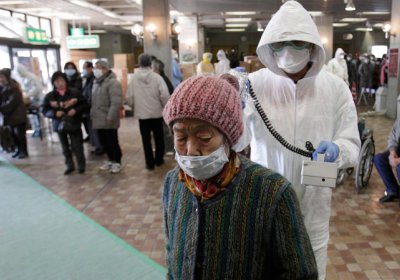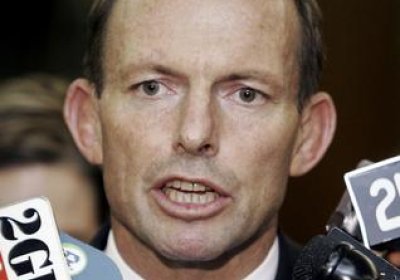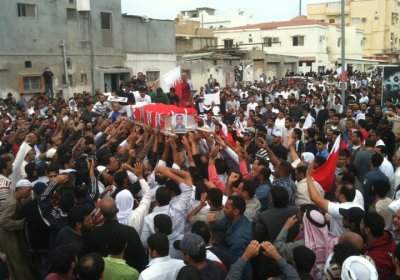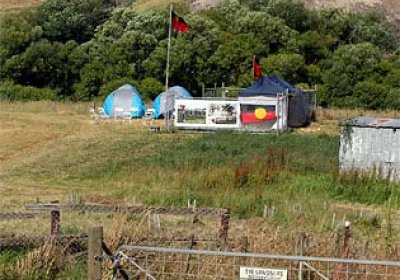Thousands of people packed into Sydney’s Town Hall on March 16 to hear journalist John Pilger, independent MP Andrew Wilkie and Julian Burnside QC speak out in support of WikiLeaks and its editor-in-chief Julian Assange.
Assange fears he may be extradited to the US and face Guantanamo Bay-style incarceration for publishing leaked US embassy cables.
Sydney Peace Foundation chairperson Mary Kostakidis presented the forum. She asked the audience to send a message to politicians in Canberra saying, “Hillary Clinton says WikiLeaks is a danger to the world … what do all of you think?”
873
After ousting former President Zine El Abidine Ben Ali and his supporters from office, the Tunisians have again hit the streets — this time, to demonstrate against the visit of US Secretary of State Hillary Clinton.
About 300 people demonstrated at Tunis’ central Avenue Bourguiba against her visit on March 16, Reuters said.
The next day, Clinton met with President Foued Mebazaa and Prime Minister Beji Caid Essebsi. About 100 people protested, in the face of dozens of riot police, two military helicopters and a water cannon, Al Jazeera said.
There's every likelihood that radioactive by-products of Australian uranium have spewed into the atmosphere from the nuclear reactor plant at Fukushima in Japan.
Liberal leader Tony Abbott is a climate change denier. He told a recent meeting in Perth that he still doubted the science of climate change and said: “Whether carbon dioxide is quite the environmental villain that some people make it out to be is not yet proven.”
His party’s campaign against the carbon price deal struck between the Labor government, the Greens and independent MPs has one central aim: to undermine public support for strong government action to tackle climate change.
Crime and Misconduct Comission (CMC) chair Martin Moynihan said on March 15 that the anti-corruption watchdog would take no further action against police accused of covering-up the death in custody of Palm Island Aboriginal man Mulrunji Doomadgee in November 2004.
In response, Aboriginal community leader Sam Watson said: “The Queensland police service have blood on their hands. This result means that the CMC [Crime and Misconduct Commission] has blood on its hands too.”
On March 17, the United Nations Security Council (UNSC) “effectively authorized the use of force in Libya”, the UN News Center said that day.
“Acting under Chapter VII of the UN Charter, which provides for the use of force if needed,” the report said, “the Council adopted a resolution by 10 votes to zero, with five abstentions, authorizing Member States ‘to take all necessary measures … to protect civilians and civilian populated areas under threat of attack in the Libyan Arab Jamhariya, including Benghazi, while excluding an occupation force.’”
Western Sahara is the last country in Africa awaiting decolonisation.
Invaded by Spain in the late 19th century, mass mobilisations in the early 1970s heralded the birth of the modern independence movement.
In 1973, the Popular Front for the Liberation of Saguia el-Hamra and Rio de Oro (Polisario Front) was established to wage an armed independence struggle.
By 1975, Polisario had fought Spain to a standstill. Rather than grant independence, Spain made an agreement with neighbouring countries Morocco and Mauritania to occupy Western Sahara.
The government of Bahrain unleashed a brutal crackdown and invited in foreign troops on March 14 in an attempt to end pro-democracy protests that have lasted for more than a month.
More than 100 people attended a March 15 public forum in Hobart Town Hall about Tasmania’s logging moratorium. The forum was organised by The Wilderness Society (TWS) and the Huon Valley Environment Centre.
TWS, the Australian Conservation Foundation and Environment Tasmania signed the forests “Statement of Principles” agreement with the Forest Industries Association of Tasmania, the Construction Forestry Mining Energy Union and Timber Communities Australia on October 14 last year.
The groups have proclaimed the agreement as the beginning of the end of forest conflict in Tasmania.
Late on March 12, a group of drunken men yelling abuse and threats of physical violence entered the site of the Aboriginal occupation of the planned Brighton Bypass in Tasmania.
Trudy Maluga from the Tasmanian Aboriginal Centre described it as a “Ku Klux Klan-type” incident, the Hobart Mercury reported on March 17.
“A group of Aborigines has been harassed and racially abused by a large group of drunken men and youths at the Kutalayna camp at Brighton,” Maluga said.
I am sure we all shared similar reactions to last week’s earthquake-tsunami tragedy in Japan.
First, we blinked at reports of a big earthquake. Perhaps for a moment our response was dulled —worn down by the string of recent disasters: the Christchurch earthquake, the Queensland floods and cyclones.
Anyway, this was Japan, a rich country and probably the most earthquake-prepared nation in the world.
Opinion polls are predicting that the likely winner of the April 10 Peruvian presidential election will be Alejandro Toledo. The candidate of Possible Peru, Toledo was the neoliberal president from 2001-06.
After the narrow victory of the moderate left candidate Susana Villaran from Social Force in the Lima mayoral elections last year, it was predicted that the left’s prospects might improve nationally.
So far this has failed to materialise, owing partly to a redoubled effort by the elite and its foreign backers to promote Toledo.
- Previous page
- Page 4
- Next page









